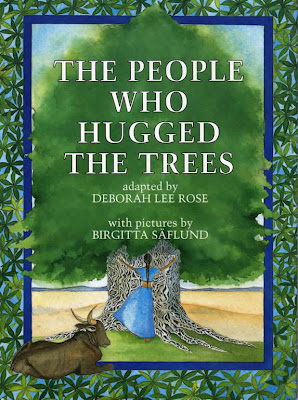India : The Story of A Blind Vulture, Some Birds and A Cat
here was once a hill that sloped down to the banks of a river.
At the foot of the hill, there grew a tree and in the hollow of this tree, lived a blind old vulture.
Many other birds lived in the same tree and out of kindness shared their food with the vulture.

In return, he looked after their young whilst they were away.
One day, a cat came to the foot of the tree with the hope of catching and eating the baby birds.
But when the little birds saw her coming, they raised an alarm. The blind vulture heard them and shouted, "Who's there?"
When the cat saw the vulture, she got frightened and said to herself; "Heavens! I am as good as dead. But I must be brave and face danger. I must try to gain his confidence."
"I….I….I just came to pay my respects, oh wise one," said the cat loudly. "Who are you?" asked the vulture.
"I am only a poor cat," she replied.
"Go away or else I'll eat you up," shouted the vulture.
"Sir, listen to me first," said the cat, "then you can kill me. But do you kill someone just because he belongs to a particular race?"
"All right," said the vulture. "I am willing to listen to you. But tell me why have you come here?"
"I live nearby on the banks of the river Ganges," said the cat." I don't eat meat. I have a bath everyday in the river and I am doing great penance for my sins.
When the birds there came to know about this, they told me, "You must learn more about religion from the old vulture who is famous for his knowledge and wisdom." "They all praised you. That is why I have come to pay my respects to you. But what do I see? That you're ready to kill me, a poor cat.
You should treat me as well as a guest ought to be treated. Even if you haven't any food to offer me, at least say something kind to me."
"But you are a meat-eater and young birds live here. So how can I trust you?" said the old, blind vulture.
The cat touched the ground and her ears as a mark of her sincerity and said, "I've read all the holy books and learn that's wrong to kill. The entire forest is full of herbs and vegetables. So why should I sin by killing birds?"
Thus the cat won the confidence of the old blind vulture and the latter allowed her to stay in the hollow of the tree.
As the days passed, the cunning cat started eating the young birds one by one and the vulture did not know what was happening.
But the birds saw that their young ones were missing and started looking for them.
When the cat saw that her game was up, she quietly slipped away.
After a few days, the birds found the bones of their young ones not far away from the tree.
"Ha!" said the birds, "the blind, old vulture has eaten our dear young children." The birds got together and killed the vulture. As for the cat, once a rascal, always a rascal.













